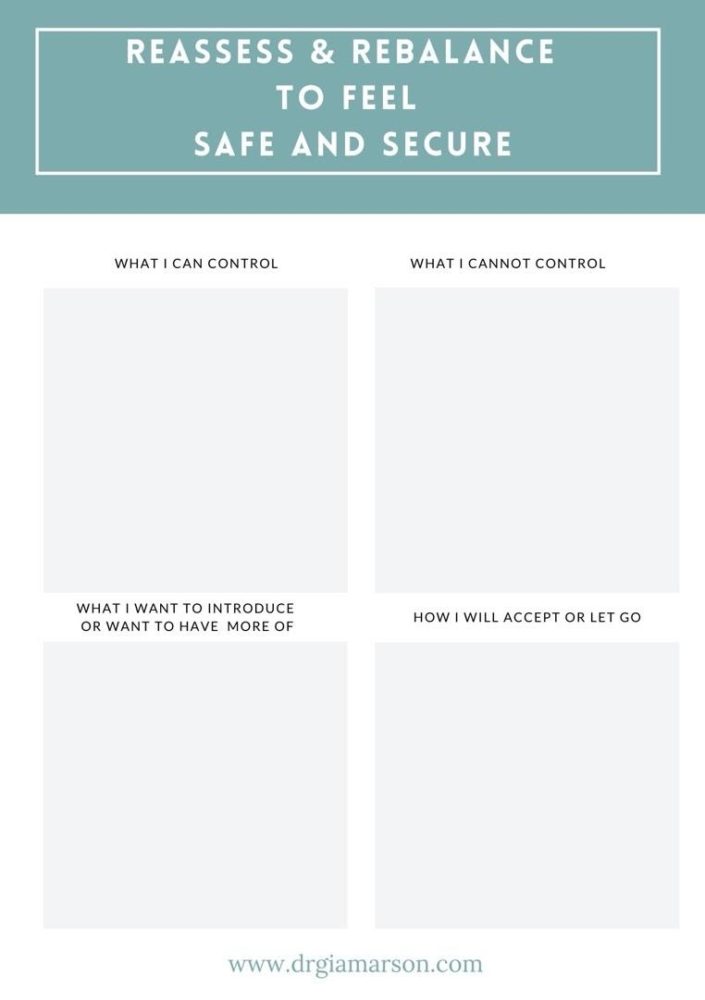Do you feel hopeless, empowered, or lost as you navigate the fallout from COVID-19?
The pandemic has impacted nearly every human on this planet. Reports of feeling hopeless and experiencing covid anxiety continue. But no matter where you are on the COVID lockdown spectrum, there are simple things you can do to feel safer, more secure, and empowered.
Understand the pandemic balancing act
Before you can gain some traction in a world that feels unstable, it helps to look at your situation from a different perspective. Let’s try that now.
Imagine you are kneeling on the seat of a barstool set on a hardwood floor. You reach your hands to the edges of the seat and lift your whole body, balancing on your arms, like the person in the photo above.
Now imagine the same balancing act, except the stool is on sand, it’s windy and raining, and people on bicycles are whizzing by you.
What is the difference between the two?
In the first scenario, you are trying to achieve something difficult, yet there is some measure of stability and predictability that enable you to strategically apply your strength and skills to lift yourself. A lot of the time, this what “typical” life feels like: challenging but within your control.
In the second scenario, your strength, skills, and the properties of the stool remain unchanged. However, you’re bombarded with the unpredictability of the weather, the ever-shifting sand, and the bicyclists zooming by. These distractions make it very difficult to know what strategy to use to keep your balance.
For many of us, the second scenario is what the last year and a half has felt like: uncertain, unstable, and too unpredictable to have a good handle on control.
If the stress of the pandemic is wreaking havoc on your mental well-being, it may be time to reassess and rebalance, so you can effectively call upon your strengths and achieve your goals. You may apply your skills differently or gain new ones. You may need to partner with someone or ask for their cooperation. Or you may need to change your vision of success all together.
Assess what it takes to feel safe and secure
In order to put yourself back in the driver’s seat of your life, ask yourself, What does it mean to be safe and secure? It can help to identify what you can and cannot control.
- Draw a vertical line down the center of a piece of paper.
- On the left side, make a list of what specifically helps you feel safe and secure that you can control. On the right side, write down aspects of safety and security that you cannot control.
- Notice what you can control that makes you feel safe and secure, and circle what you are already doing and what’s currently present in your life.
- In the left column, make a list just below the first that comprises the remaining items that you did not circle. Make an action-based plan for how to introduce or increase them in your life. Start with very small changes.
- Review what you cannot control. Consider how you will accept what you can’t control. Remember, even when you can’t control a situation or outcome, you can control how you deal with it. You might meditate or exercise outdoors or vent to a friend—these are some of many helpful coping strategies that bring ease and grounding. Accepting and letting go of what you can’t control isn’t easy, and it takes practice. Write out what you will do to cope with and to face areas of life that are outside of your control.
See the graphic for an example.

Review your values
Fear-inducing messages and images are everywhere during this pandemic. And the anxiety we are collectively experiencing can cause many of us to behave as if under threat.
To act more intentionally, instead of reactively, it’s helpful to reassess your values.
It’s possible that your values have changed somewhat or even significantly since COVID-19 first started in late 2019/early 2020. Things that you highly valued in the past may be less important to you now. Other values may have risen to the top of what you care about. Take some time to identify what really matters to you. What values are your highest priorities now? Determine whether where you spend your time is aligned with what you care about most.
If you need a refresher on what constitutes a value, check out this three-minute video: The Values-Focused vs The Goals-Focused Life.
Be open to being flexible
Has this pandemic, the ever-changing COVID-19 variants, diverse geographic responses, and dynamic information about vaccines upended aspects of your life? While you may be having trouble holding on to what worked in the past, you can change your perspective.
Take stock of how you navigate school, work, relationships, health, freedoms, activities, travel, and other activities. Do you see disruptions or possibilities? Do thoughts of the past—what life used to be like—come up and bring with it negative feelings? Do you worry about the future? Do things feel hopeless? In spite of losses, it’s important to try to be adaptive and flexible.
Celebrate all positive changes in your sense of safety and security
Rather than focusing on what you’re getting wrong as a way to improve, when it comes to developing resilience post-pandemic, highlight what you’re getting right. Observe when you feel better, safer, less burdened. Notice positive shifts in your mental load. Acknowledge even the smallest moments of feeling elevated. These are the times when you are likely to be exerting positive control and embracing acceptance.
If you have trouble or get stuck, try adopting a growth mindset as a guide.
No matter what, stay committed to what you can control, let go of what you can’t change, and focus on values rather than fear—these actions can lead you forward.
All Blogs


